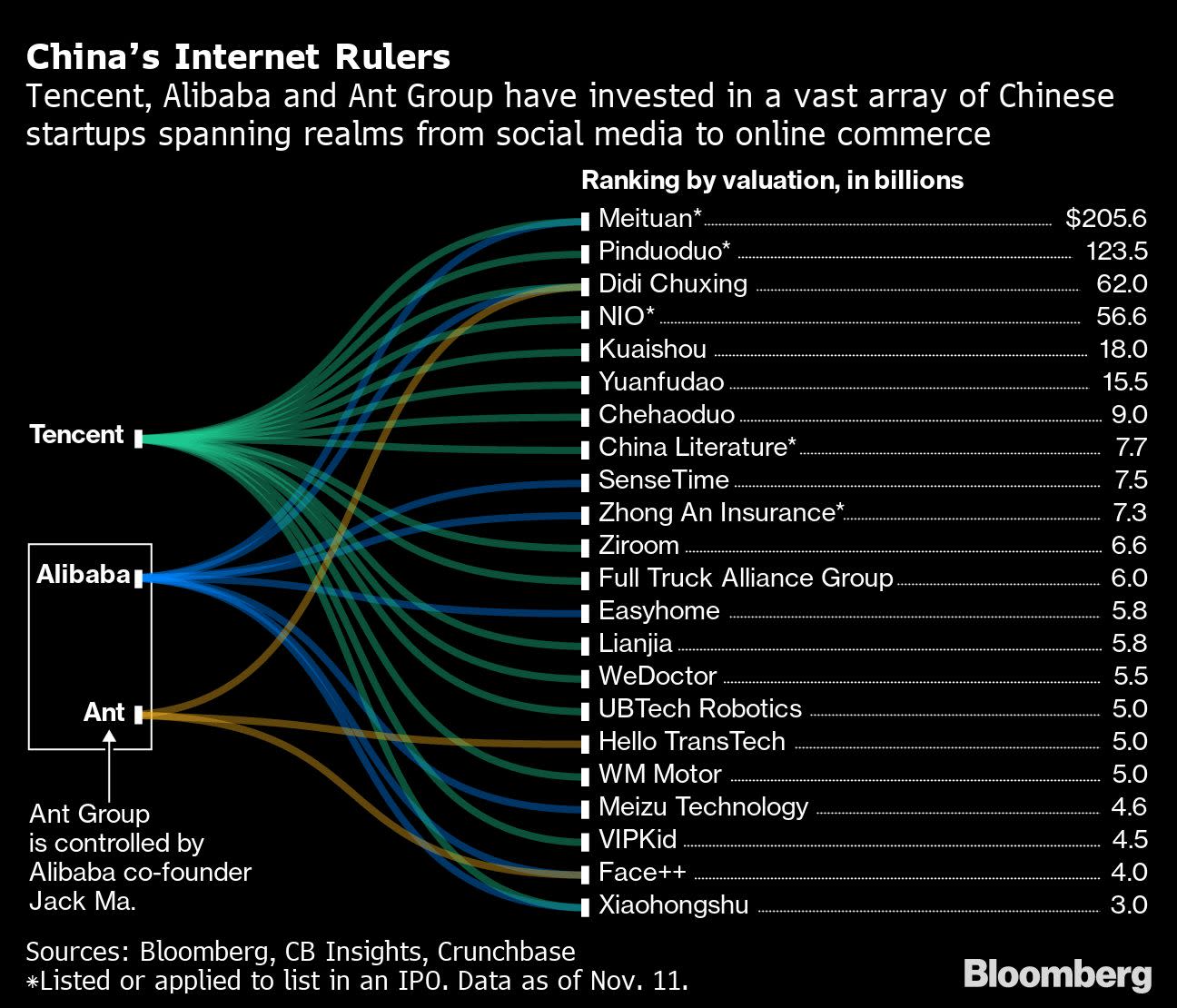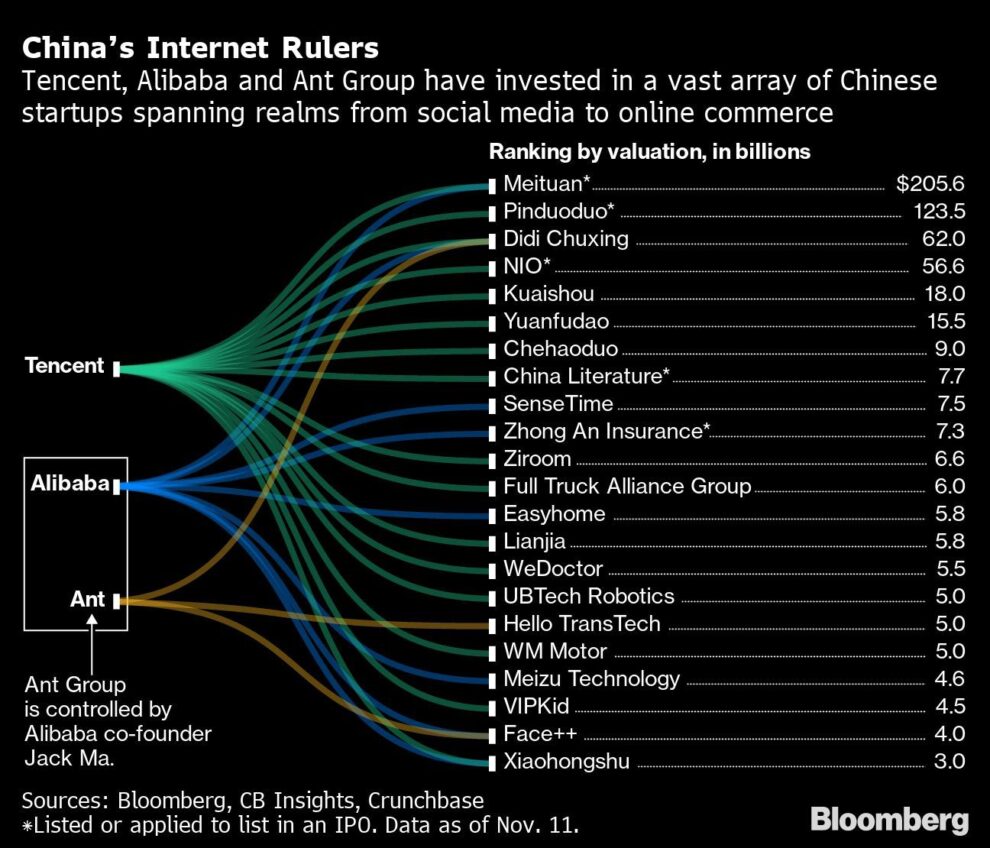
(Bloomberg) — China’s antitrust watchdog fined Alibaba Group Holding Ltd. and a Tencent Holdings Ltd. unit over a pair of years-old acquisitions and said it’s reviewing an impending Tencent-led merger, signaling Beijing’s intention to tighten oversight of internet sector deals.
The State Administration for Market Regulation said Monday it’s reviewing the combination of DouYu International Holdings Ltd. with Huya Inc., which could create a Chinese game streaming leader akin to Amazon’s Twitch. It fined Alibaba 500,000 yuan ($76,500) for failing to seek approval before increasing its stake in department store chain Intime Retail Group Co. to 73.79% in 2017, while China Literature Ltd., the e-books business spun off by Tencent, was also censured over a previous deal, according to a statement.
The penalties come after regulators last month declared their intention to increase scrutiny of China’s largest tech corporations with new anti-monopoly rules. Beijing in November unveiled draft regulations that establish a framework for curbing anti-competitive behavior such as colluding on sharing sensitive consumer data, alliances that squeeze out smaller rivals and subsidizing services at below cost to eliminate competitors. Shares in Alibaba and Tencent extended losses and closed down more than 2.5%.
Read more: China Clampdown on Big Tech Puts More Billionaires on Notice
“Investment and takeovers are important means for development and growth of internet companies,” the regulator said in the statement. “The above-mentioned companies have a large influence in the industry, carry out many investments and takeovers, have specialized legal teams and should be familiar with the regulations governing M&A. Their failure to actively declare has a relatively severe impact.”
Beijing’s heightened scrutiny is spurring fears of a broader crackdown on the country’s largest firms. On Monday, shares in No. 3 internet company Meituan plunged 3.8% after the People’s Daily wrote an editorial slamming the industry’s preoccupation with growing traffic and volumes in areas such as grocery delivery, at the expense of real scientific innovation.
China’s two largest corporations are also its most acquisitive, using scores of deals to expand into adjacent fields and groom some of the country’s most promising startups.Alibaba had led a $2.6 billion buyout of Intime as part of efforts to develop new business models that combine e-commerce with brick-and-mortar retailing. China Literature agreed in 2018 to buy New Classics Media for as much as 15.5 billion yuan to expand in filmed content.
The companies had failed to seek approval for the deals, which aren’t deemed anti-competitive, the antitrust regulator said Monday. China Literature said in a statement that it has been actively working with regulators on compliance, while Alibaba representatives didn’t immediately respond to requests for comment.
Read more: Jack Ma Bets $2.6 Billion He Can Revamp China Retail Sector
What Bloomberg Intelligence Says:
Alibaba’s ability to strengthen its domestic e-commerce ecosystem through M&A may be significantly weakened on rising anti-monopoly scrutiny, underlined by a 500,000 yuan fine by the State Administration for Market Regulation on Monday for failing to seek approval for its stake acquisitions of Intime Retail in 2014-18. While the amount is immaterial to Alibaba, retroactive application of new anti-competitive rules announced in November may be a stern warning to toe the line in future.
— Vey-Sern Ling and Tiffany Tam, analysts
Click here to read the research
Huya in October agreed to buy DouYu in an all-share deal and Tencent, which currently owns stakes in both companies, was expected to hold about 68% of the merged business’s voting shares. That would have given the WeChat operator control over the leader in the live-streamed gaming market, estimated to generate 30 billion yuan in revenue this year, according to the latest numbers from iResearch.
An affiliate of SF Holding Co. was also fined for not declaring a takeover of a competitor, Monday’s statement showed.
“Despite its relative modest amount, the penalty announced today has a symbolic importance,” said Scott Yu, an antitrust lawyer with Beijing-based Zhong Lun Law Firm. “The announcement, together with the draft antitrust guidance unveiled in November, signals that Beijing will pay close attention to the monopolistic status of Chinese internet companies.”
(Adds China Literature comment in seventh paragraph, estimated size of live-streaming game market in eighth paragraph)
For more articles like this, please visit us at bloomberg.com
Subscribe now to stay ahead with the most trusted business news source.
©2020 Bloomberg L.P.











Add Comment